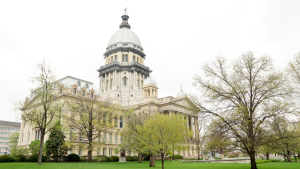Lead in Drinking Water
Protecting clean water in Illinois is essential to community, economic and ecosystem health.

GREAT LAKES
The Great Lakes is the largest freshwater ecosystem on Earth

infrastructure
Illinois's water resources face many infrastructure challenges

nutrient pollution
Nitrogen & phosphorus pollution degrade our water

drinking water
Lead in drinking water threatens many IL communities
Preventing Lead in Drinking Water
Lead in Drinking Water Act
- Sampling: The testing must consist of two samples, the first conducted with no flushing of the system within at least 8 hours, and the second timed to capture problems with different portions of the water system serving the school. This protocol is based in part on the Chicago Public Schools approach, where 5 samples were collected at each outlet, due to finding some higher levels in later samples; but the state approach was modified to reduce the costs on schools while capturing a significant portion of the system.
- Availability/notification of results: Schools must submit all test results to the Department of Public Health. If any sample at a school tests above 5 parts per billion (ppb) of lead, the school must provide individual notification of the results to all parents of children at the school; results at or below 5 ppb may be posted on the school’s website.
- Testing schedule: Older schools built prior to 1987 (when new federal standards for lead in plumbing came into effect) must go first, with testing due by the end of 2017. Newer schools built between 1987 and 2000 are included as well, again based on experience in Chicago showing problems at newer schools, and must complete testing by the end of 2018 (the Department of Public Health is also required to determine by 2019 whether schools built after 2000 must test).
- Exception: There is an exception for schools that have already conducted lead testing voluntarily, which may apply for a waiver.
Guidance on mitigation of lead in school drinking water
Lead service line inventory and notification of work on mains or meters
In addition, owners and operators must take additional steps beyond those required by federal regulations to compile an (annually updated) inventory of lead service lines within or connected to their distribution systems, including privately owned lead service lines. Owners and operators must also provide at least 14-days prior notice to residents of planned work on water mains or lead service lines that may impact the levels of lead in their drinking water, as well as notification of repair or replacement of water meters when such work is initiated. The notifications must include warnings about the potential impact of the work, information about best practices for preventing consumption of any lead in drinking water, and information regarding the dangers of lead in young children.
Funding sources for compliance with school testing and other requirements
The new law amends a number of existing state laws to enable schools, water suppliers and municipalities to access various funds or impose fees for purposes of complying with the new testing requirements and other aspects of the new law, or to get recovery for compliance-related costs in their rates.
Clean Water Updates
Analysis: Trump’s Big “Ugly” Bill
H.R. 1 drastically cuts key clean energy tax credits, chipping away at Illinois’ progress toward a clean energy economy and threatening to cut as many...
Read More >>Protected: Illinois’ Role in Great Lakes Protection
There is no excerpt because this is a protected post.
Read More >>2025 Legislative Report
IEC's state legislative team has published our 2024 Legislative Report detailing environmental wins and setbacks during this year's legislative session.
Read More >>As Chicagoans Brace for Higher Water Bills, Groups Push for Affordability Reforms
Water rates have more than doubled since 2010. Low-income residents feel the pinch most of all. On Sunday Chicagoans will face another spike in their...
Read More >>On Earth Day, EPA union workers decry cuts to clean air and water regulations
Fifty-five years after the first Earth Day, Environmental Protection Agency employees and advocates call for help as the Trump administration rolls back environmental regulations and...
Read More >>Illinois Has Your Back, Mother Earth
We can’t count on Washington to do right for the environment. Good thing Illinois’ environmental movement is on top of it.
Read More >>




